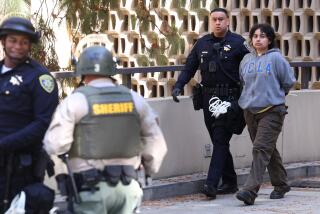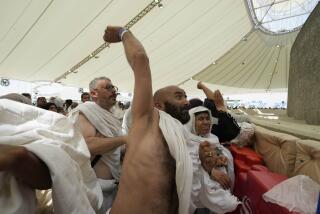Muslim American summer camp blends faith and fun
It’s a hot summer morning and the campers trundle through the gates of a Pasadena grade school, then fall in with their age groups: the Seeds, the Dates, the Coconuts and the Trees.
A day of typical camp activities awaits: scavenger hunts, a “pirates and princesses” dress-up play and water-balloon tosses. But there is a difference here: Those activities are sandwiched between Koran recital, the Dzhur afternoon prayer and story time that includes tales about Mecca and Muhammad.
Even as one of the counselors tries to bring order to the paper boat race, it’s a moment peppered in faith. “Let’s play fair,” said Noor Elfarra, 16, adjusting her hijab head scarf as she led her charges. “You’re not supposed to touch the boat. You can only blow on it. Insha Allah [God willing] you can win!”
This is Camp Izza, believed to be the only Muslim summer camp in the U.S. that is accredited by the American Camp Assn. Located on school campuses in Irvine and Pasadena, Camp Izza is run by husband and wife Omar and Munira Ezzeldine as a means of instilling izza — the Arabic word for “pride” — in Muslim youths.
“We want the kids to be proud of who they are as Muslims,” said Omar Ezzeldine, 36, who was born in Los Angeles to Egyptian parents.
Most of the campers are children of immigrants from predominantly Islamic countries. Their U.S. upbringings mean not all of them know how to pray. When prayers are recited, Ezzeldine or one of the counselors will lead.
“That’s OK,” Ezzeldine said. “I make it a point to enunciate the verses. I tell everyone whatever your level of prayer is today, make it better tomorrow.”
Given current attitudes in the U.S. toward American Muslims, “a better tomorrow” is loaded with meaning.
FBI data indicate that hate crimes against Muslims seem not to be diminishing. Although anti-Muslim crimes fell to 107 in 2009 from nearly 500 in 2001, the latest data, from 2010, show that such hate crimes rebounded to 160.
In the days following the deadly attack on a Sikh temple in Wisconsin this month, at least seven Islamic centers reported vandalism, including fires and shot-out windows. (Sikhs are sometimes mistaken for Muslims.) The Council on American-Islamic Relations, or CAIR — a Muslim civil rights and advocacy group based in Washington, D.C. — posted a safety advisory for mosques and their worshipers.
And in a recent Gallup World Religion Survey, 53% of Americans said their opinion of Islam was “not too favorable” or worse — a much higher percentage than expressed negative feelings about other major religions.
The children at Camp Izza face a challenge their parents did not: establishing their identities in a culture where anti-Islamic rhetoric can be found in political campaigns, cable news punditry and Hollywood films.
“It’s important for [my son] to be somewhere where a positive attitude toward his faith is reinforced,” said Samar Ghannoum, 46, who sent her 8-year-old Kareem to the camp this summer. “He is the future, in a lot of ways. He is American and Muslim.”
And it’s likely that the Camp Izza model will be duplicated because the U.S. Muslim population is growing at a relatively fast pace.
CAIR says that about 7 million Muslims live in the U.S. but that the community is so diverse, it is hard to gauge the exact number. “It’s difficult to get a handle on it. The census don’t ask for religious backgrounds. It is difficult to reach the Muslim community through polling methods,” CAIR spokesman Ibrahim Hooper said.
Meanwhile, a recent study by the Pew Research Center’s Forum on Religion & Public Life says the U.S. Muslim population will jump to 6.2 million in 2030 from 2.6 million in 2010. Nearly two-thirds of the Muslims in the U.S. today are immigrants; the rest were born in the country, according to the center.
***
Although mosques and Islamic centers across the U.S. offer summer programs, Camp Izza integrates Islamic lessons with activities more like a Nickelodeon game show than a Friday at the masjid.
During a game of hot potato on the Pasadena campus last month, campers passed a ball to one another, hoping they wouldn’t be stuck with it when their counselor Maryam Amirebrahimi pushed pause on the CD player. A 9-year-old girl in a head scarf passed it to a 10-year-old boy in swimming trunks, and then the sound stopped.
Subhanallah (Glory to God), the kids shouted as he left the circle. Another counselor pushed play, and the recorded selawat (praises) of the prophet Muhammad started up again.
“They should be able to say they like learning” about their faith, Ezzeldine said. “It’s a beautiful thing when a child finishes the Koran by the end of camp.”
As an undergraduate of physiology at UCLA who later received a doctorate in educational leadership, Ezzeldine has served as a counselor at a charity camp for underprivileged kids in Los Angeles and at Camp Wayne in Pennsylvania, which has campers from wealthier families.
“I really think kids are kids and they have needs to be met,” said Ezzeldine, whose own children (Yusuf, 11; Zayd, 9; and Ali, 4) also attend Camp Izza. “They need to feel valued and understood, and they need opportunities to explore interests and skills.”
It is unknown exactly how many Muslim summer camps there are in the United States. Out of the 12,000 summer camps in the country, the American Camp Assn. has accredited 2,400, only 250 of which have religious affiliations. Izza is the only Muslim one on that list.
Jalel Aossey, the former director of Muslim Youth Camps of America, closed his organization last year after 13 years in business when he realized he could not design a camp that would meet American Camp Assn. accreditation standards.
There are other obstacles as well. Institutions such as the Khalil Gibran International Academy in Brooklyn (a nondenominational public school that teaches Arabic) and mosques such as the one slated to be built at ground zero in New York have been beset by angry protests and polarizing political opinions.
Camp Izza has not faced those problems. Ezzeldine counts his camp as lucky, or perhaps blessed.
Bismillahir rahmanir rahi (In the name of Allah, the most beneficent, the most merciful), the 11-year-olds in the camp’s Trees group recite, as Muslims traditionally do before reading a sura (chapter) from the Koran. Counselor Amirebrahimi, 25, helps them along.
When she was about their age, she had only one ambition: to be the next Britney Spears. But during a trip to Mecca in Saudi Arabia as a teen, the Iranian American experienced an epiphany.
At Camp Izza, she’s helping those in her wake navigate the often tricky terrain that comes with being both Muslim and American.
“We love the Koran,” cheerleads Amirebrahimi as the kids finish the sura, close the holy book and head out for the water slide.
More to Read
Sign up for Essential California
The most important California stories and recommendations in your inbox every morning.
You may occasionally receive promotional content from the Los Angeles Times.










